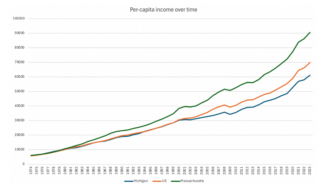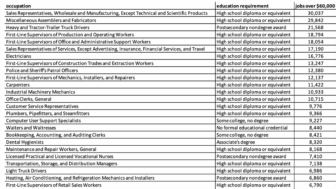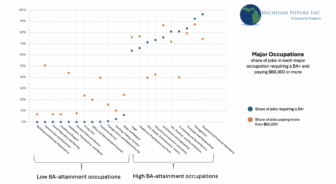
Google, with much fanfare, recently announced “three new Google Career Certificates in the high-paying, high-growth career fields of Data Analytics, Project Management, and User Experience (UX) Design. Like our IT Support and Automation in Python Certificates, these new career programs are designed and taught by Google employees who work in these fields.” They further announced they would provide “100,000 need-based scholarships, funded by Google, to complete any of these career certificates.”
Seems like good news. And in some ways it is. A corporation getting more involved in developing their future workforce, in this case in high-paying fields. And providing needs-based scholarships to pay for that training. We need more of both.
But what definitely isn’t good news is Google positioning this training as a substitute for obtaining a four-year degree. In a post about the new Google Career Certificates, Google SVP of Global Affairs Kent Walker wrote:
College degrees are out of reach for many Americans, and you shouldn’t need a college diploma to have economic security. We need new, accessible job-training solutions—from enhanced vocational programs to online education—to help America recover and rebuild.
Inc., citing Mr Walker’s post, titled their article about the initiative Google has a plan to disrupt the college degree. Google’s new certificate program takes only six months to complete, and will be a fraction of the cost of college.
The evidence is clear that this kind of short-term technical training program is an inferior path to good-paying careers compared to obtaining a four-year degree. The data are clear that the four-year degree is the most reliable path to good-paying forty-year careers. As we wrote in a previous post:
Maybe the most important reality is that the work earnings premium, using CPS data, is larger for 35-44 years old than it is for 25-34 year olds. So let’s assume employers are dopes and they over pay for the four-year degree credential in hiring for first jobs. That they could get the same or better skills for entry-level professional jobs if they didn’t screen for a four–year degree. If that were true the wage premium for 35-44 year old college grads should go down, not up. Employers in terms of who gets a raise and who gets promoted are doing so on the basis of performance, not credentials.
But the exact opposite happens: the median work earnings premium for a four-year degree goes from $17,000 to $25,000 compared to those with a two-year degree where the wage premium is the narrowest. The increased median wage premium as you get on in your career, almost certainly, is a reflection that the skills you developed earning a BA are of value in work performance.
In addition, there is Harvard’s David Deming’s work using American Community Survey data on earnings by degree that shows that by age 40 liberal arts majors earn as much as STEM majors. Because employers value/promote those with broader, so-called soft-skills rather than occupation specific skills. He summarizes his findings in a New York Times op ed entitled In the Salary Race, Engineers Sprint but English Majors Endure.
What is so infuriating about Mr Walker positioning this initiative as an alternative to getting a four-year degree is Google, probably more than any company in America, knows better. By far the most read Michigan Future post is on Google’s research that the seven top characteristics of successful employees at Google are all soft skills: being a good coach; communicating and listening well; possessing insights into others (including others different values and points of view); having empathy toward and being supportive of one’s colleagues; being a good critical thinker and problem solver; and being able to make connections across complex ideas.
These are not skills one learns in a six month career certificate training program. As the Washington Post wrote about the Google research:
Those traits sound more like what one gains as an English or theater major than as a programmer. Could it be that top Google employees were succeeding despite their technical training, not because of it? After bringing in anthropologists and ethnographers to dive even deeper into the data, the company enlarged its previous hiring practices to include humanities majors, artists, and even the MBAs that, initially, Brin and Page viewed with disdain.
Probably the best evidence that a four-year degree is superior education is the education the affluent are providing their own kids. As we explored previously, the Federal Reserve found in their annual report on the economic well-being of America households that 72 percent of those 22-29 with at least one parent with a bachelor’s degree have a B.A. This compares to 35 percent with a B.A. of those 22-29 with at least one parent with some college but neither with a bachelor’s degree and 19 percent of those with both parents having a high school degree or less.
As thinkLaw’s Colin Seale wrote for Forbes:
Lastly, it is hard to hear experts claim that college is no longer necessary without asking a clarifying equity question: college is no longer necessary for whom? The over-representation of students representing the 1% of the wealthiest families in the United States at elite institutions suggests that college is still necessary for this overwhelmingly white population. … Affluent families are allegedly willing to lie, cheat and pay boatloads of cash to get their children into selective colleges, apparently owning the fact that merit is less important than access. It is inequitable to support a “college isn’t for everyone” mentality that treats higher education as an obvious expectation for students from privileged backgrounds and as a luxury good for others.
Rather than using “college degrees are out of reach for many Americans”as a rationale for steering others’ kids into technical training programs, what Google and other American corporations should be doing is fighting to change public policy at the state and federal level that have made a four-year degree out of reach for far too many. They need to be at the forefront of reversing decades of disinvestment in education for non-affluent children from birth through college and ending education designed to build narrow first-job skills in others’ children while at the same time providing their own kids with a broad liberal arts education from birth through college.
“College degrees are out of reach for many Americans” is not preordained. It is a political choice. As long as we pursue that path we are cementing an growing education caste system in American, where for the first time ever your parents’ education is the best predictor of your education attainment. It is far past time that Google, and all of corporate America, learn the lesson that as long as we have huge gaps by race and class in four-year degree attainment America will not substantially reduce income and racial inequality. End of story!







